Keywords: Clergy Sex Abuse
-
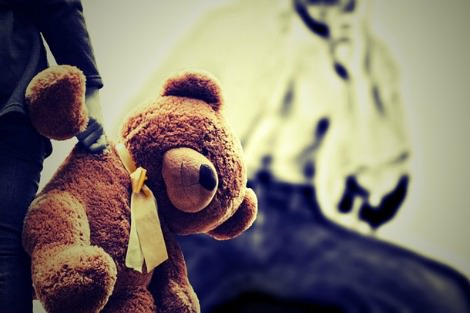
RELIGION
- Francis Sullivan
- 08 November 2016
14 Comments
With all institutions taking part, this scheme will succeed and it will deliver fair, consistent and generous redress for survivors. If some institutions don't take part it will be yet another blow to abuse survivors, with some reaping the scheme's benefits while others are left to suffer further defeats and humiliations. A case in point is the South Australian government. Before the ink was dry on the announcement, SA had already indicated it would not take part. This is appalling, whatever the justification.
READ MORE 
-
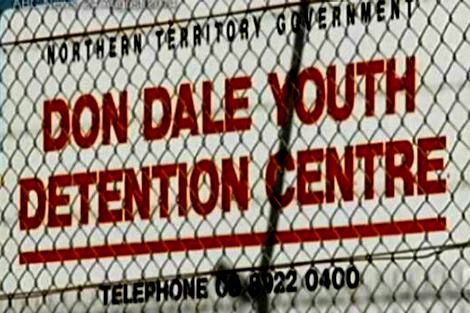
AUSTRALIA
- Ann Deslandes
- 11 October 2016
2 Comments
'Finally!' we might think, regarding the commencement of the royal commission after the mainstream revelation of the abuses at Don Dale and other juvenile detention centres. But is this just another deferral to a disinterested power? What can we hope will come of moves like this from leaders whose own legitimacy feels so craven and thin? I suspect not much. There are already claims the royal commission into the protection and detention of children in the NT is on shaky ground.
READ MORE 
-

RELIGION
- Frank Brennan
- 23 September 2016
18 Comments
'No good will be served by a royal commission auspiced by the state telling a Church how it judges or complies with its theological doctrines and distinctive moral teachings. By all means, set universal standards of practice expected of all institutions dealing with children, but do not trespass on the holy ground of religious belief and practice.' Fr Frank Brennan SJ addresses the Freedom for Faith Conference in Melbourne, 23 September 2016.
READ MORE
-
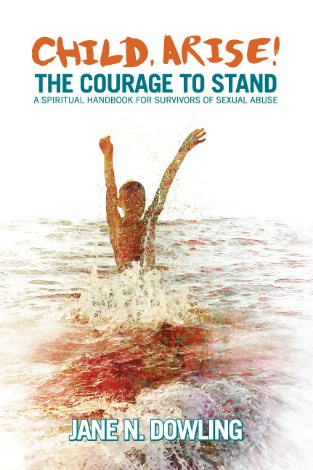
RELIGION
- Andrew Hamilton
- 01 September 2016
15 Comments
Dowling, who was a victim of clerical abuse, offers a program of reflections that bring together scriptural themes and the effects of sexual abuse. Most striking is the extraordinary labour required to purify the language of a tradition that has become polluted. This is vital not simply as a therapeutic exercise but as a condition for renewal and reconciliation. It may also be pertinent to wider society, where Brexit and the Trump phenomenon have been characterised by a coarsening of public language.
READ MORE 
-
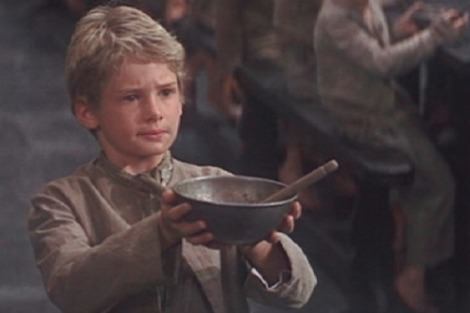
AUSTRALIA
- Kate Galloway
- 26 August 2016
15 Comments
Oliver Twist is still used to aid understanding of the trauma arising from poverty, and the suffering of children at the hands of individuals and within institutional settings. In broader Australian society we assume Dickensian attitudes to children have evolved. Aligned with the sentiments behind child protection, society's image of children and childhood is idyllic. Yet beneath this veneer lies a substratum of deeply ambivalent, even malevolent, attitudes towards children with a distinctly Dickensian flavour.
READ MORE 
-
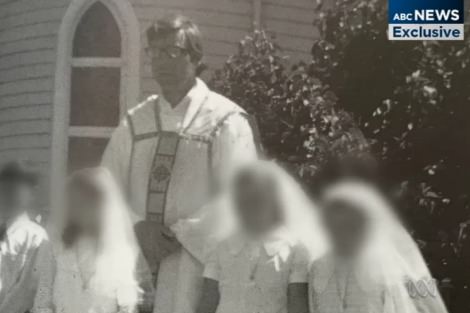
RELIGION
- Frank Brennan
- 29 July 2016
81 Comments
Wednesday night's ABC 7.30 program carried allegations against Cardinal George Pell which, if true, are devastating: life ruining for victims like Damian Dignan and Lyndon Monument; confronting for all citizens committed to the wellbeing of children; and earth shattering for Catholics who still have faith in their church. The report is also troubling for those of us concerned about due process and the rule of law - not as academic notions for lawyers but as the secure bulwarks of a society in which everyone's rights and interests are protected.
READ MORE 
-

AUSTRALIA
Having worked in closed organisational systems like Victoria Police and various government departments, I have often reflected on how and at what point organisations and their employees become comfortable with the belief that their ideas and attitudes are better informed than those of the general populous - and that their survival is more important. A very stark example of this are the recent court decisions relating to the Hillsborough Stadium disaster in 1989, where 96 people were killed.
READ MORE 
-

RELIGION
- Frank Brennan
- 22 April 2016
16 Comments
The Royal Commission into Institutional Responses to Child Sexual Abuse has now published its Case Study 26 on the Neerkol Orphanage in Rockhampton. It finds that the response by the bishop and by the Sisters of Mercy to victims making complaints prior to 1996 was often inadequate and lacking in compassion. The word 'compassion' or 'compassionate' appears 21 times in the report. I have no problem with church people or other individuals adversely judging church leaders for a lack of compassion. There may even be a case for politicians doing it. But I don't think it's the job of a royal commission.
READ MORE
-

RELIGION
- Andrew Hamilton
- 07 April 2016
19 Comments
How do good people sink to this? The answer lies in the mutation of economic ideology from the crude buccaneering spirit of doing whatever it takes to get rich into a more urbane form. People see themselves as competing, not only for their own economic benefit, but for that of the company. This means greed can mask itself as altruism in serving a larger good. And as in the case of churches, identification with the company provides reason for protecting the company's reputation at all costs.
READ MORE 
-
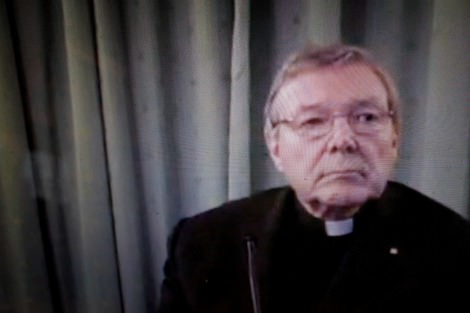
AUSTRALIA
- Paul Coghlan
- 07 March 2016
42 Comments
'It was a sad story and it wasn't of much interest to me.' Pell's brutal response to a question from the royal commission has provided an important point of organisational, personal and cultural reflection. As a survivor of child sexual abuse I understand the disbelief, shock and outrage that such a comment has provoked. And having conducted many organisational reviews, I know that in trying to find the origins of such responses, our understanding of how the world works expands exponentially.
READ MORE 
-
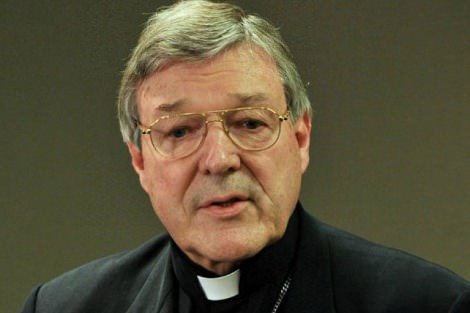
RELIGION
- Frank Brennan
- 23 February 2016
47 Comments
McClellan and his fellow commissioners on the Royal Commission into Institutional Responses to Child Sexual Abuse have a daunting task in the next fortnight, according due process and natural justice to a high profile witness on the other side of the world who has been publicly labeled 'scum', 'buffoon' and a 'coward', being the subject of unauthorised leaks about uninvestigated complaints from a police service which itself is under scrutiny for its past cooperation with the witness and his Church.
READ MORE 
-
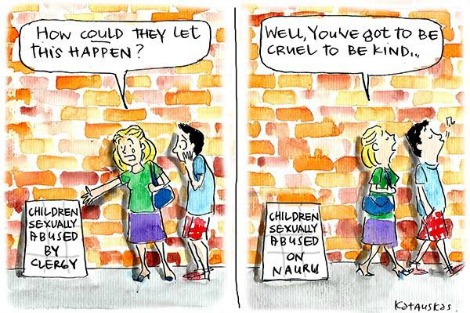
CARTOON
- Fiona Katauskas
- 10 February 2016
5 Comments
This week's offering from Eureka Street's award winning political cartoonist.
READ MORE 